In our August issue, we feature a new and fun way to explore the pristine beaches of southern Mozambique that involves fatbiking!
As part of the assignment, I went on the first-of-its-kind tour with Detour Trails to explore Maputaland by fat bike. As a result, I found myself cycling alongside 14 enthusiasts and cycling veterans.
Here are 8 things I learnt while hanging out with cyclists.
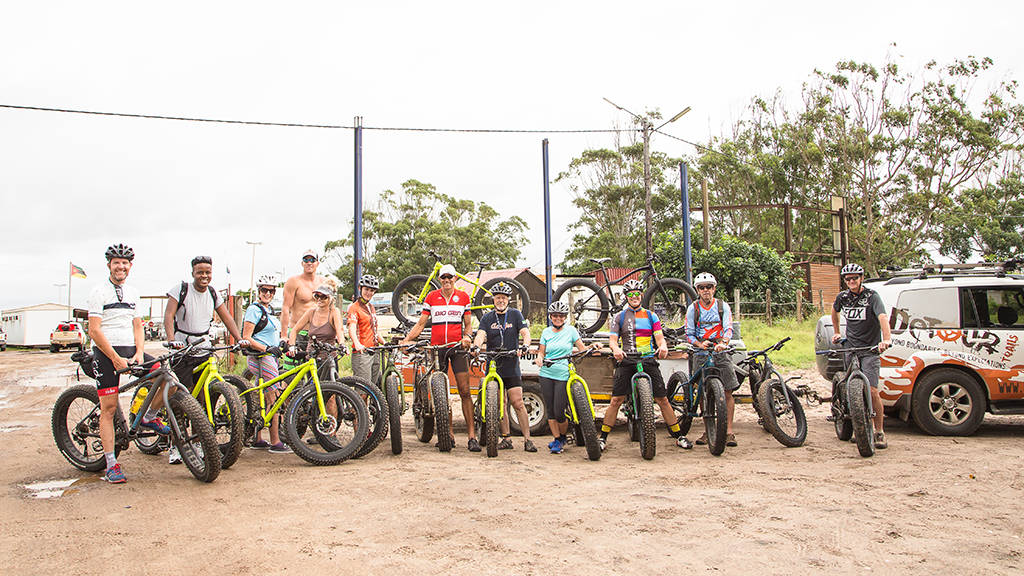
Team photo at the Kosi Bay Border. Photo by Tyson Jopson.
1. Cadence
The trip was made up of the likes of Ride Magazine editor, Tim Brink and Julian Bryant who’ve both completed the Cape Epic more than once. Show-off cyclist and deputy editor at Getaway Tyson Jopson; bonafide wild man and National Geographic presenter, Andy Coetzee and leader of the expedition, Rohan Surridge. Given the calibre of cyclists on this trip, there was a lot of bike-speak thrown around. I learnt the word ‘cadence’ which refers to one’s rate of pedalling, generally measured per minute. Andy advised that on average I ought to have been aiming for 50 pedals per minute as this was an amble. I found the counting helpful in increasing focus.
2. Berm
Right next to cadence is the ‘berm’, which I think a lot of cyclists say just to sound like ‘real’ cyclists. It refers to a curving corner that stretches out in a half circle like a roundabout. Berms are generally popular in mountain biking where tracks are constantly turning. Use this word around cyclists and no cyclist will suspect you of not riding a bike or being a novice. In the Maputaland amble, we came across berms while cycling in a nearby beach forest in Ponta Malongane.
3. Cycling on sand is not as easy as we all dream it to be
Prior to this assignment, my cycling experience involved a total of three laps on the Sea Point Promenade with Up Cycling. Cycling on the promenade is as easy as we dream it to be; you get to coast and enjoy the view without breaking a sweat. Fat-bikes on sand, that’s another story. There was not a single moment of coasting (when you also get to rest from pedalling for a few seconds). You pedal the entire way on the sand, which is great because now I can proudly say that I pedalled every single one of those 79 kilometres.
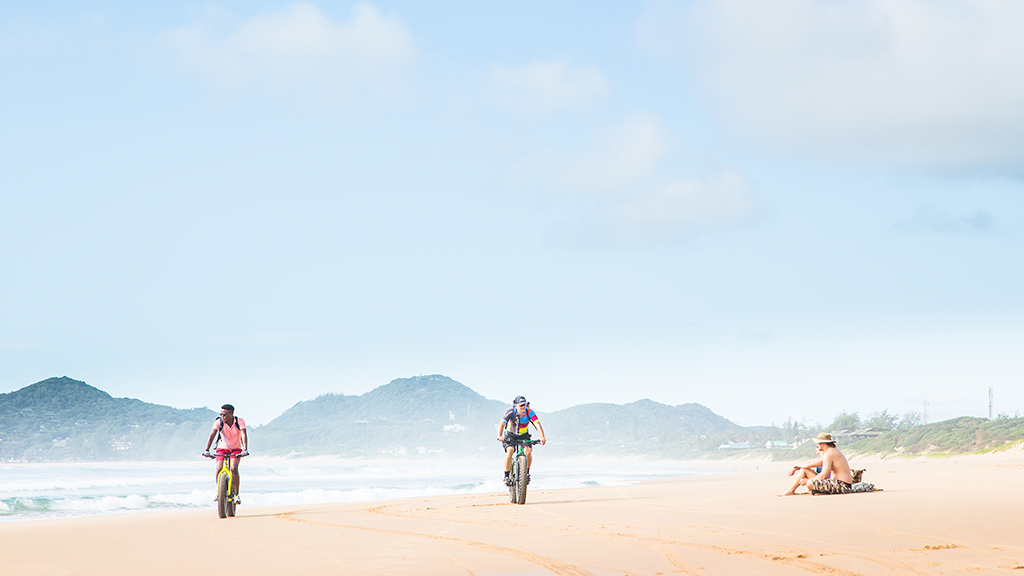
Day two starts off on the beach. Photo by Tyson Jopson.
4. It takes a lot to get off a bike and push it
The tour began from the border to Ponta Do Ouro. On our way, we cycled past a small village market, where we were cheered on the side of the road. Overwhelmed by the cheering, I forgot to adjust the brakes as I was approaching a hill and by the time I saw the hill, it was too late to do anything which meant I had to get off the bike and push it amid the cheering. Getting off a bike and pushing it is a brutal way of admitting defeat, no one does it voluntarily.
5. Energy recovery is so much better in cycling
With each break that we took, I found that I was ready to keep pedalling much further than I had the last time. With each break, I was encouraged to keep pushing further because after a break I wouldn’t be as tired and exhausted as I had initially suspected. In addition to that, I could go further before stopping to break again which meant that the need to stop for a break decreased the more I cycled – unlike running, where your body is likely to get more tired. Towards the end of the trip, I felt ready to start my training for the Cape Epic (not).
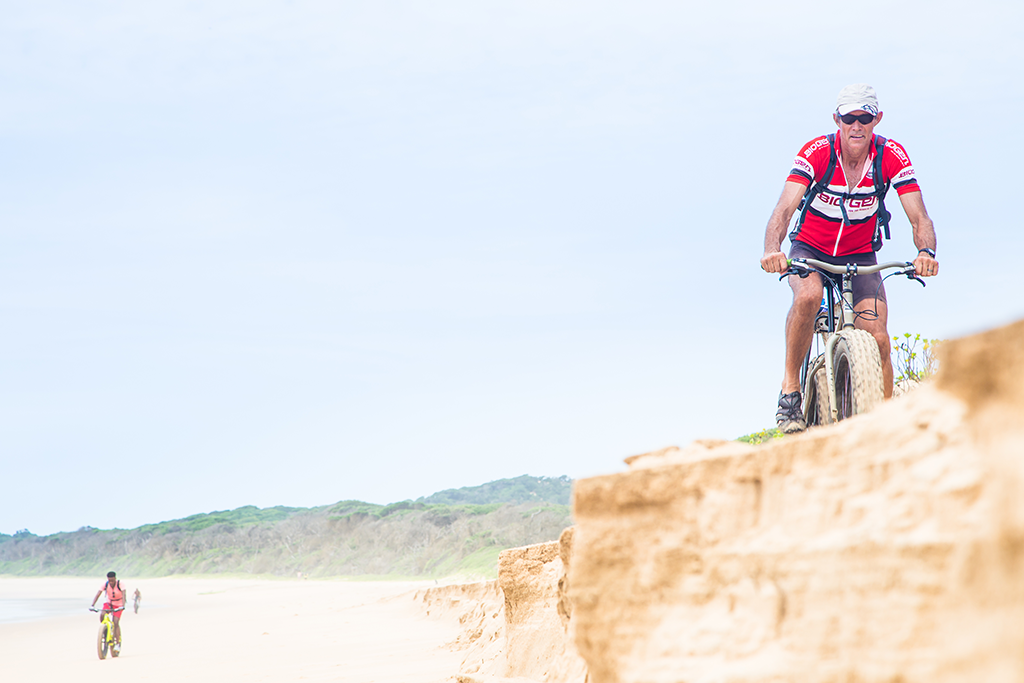
Mark Coetzee cycling ahead while Welcome Lishivha and others, lag behind. Photo by Tyson Jopson.
6. Look at least 10 meters ahead
Cycling from the border into Ponta Do Ouro was very challenging for me because of the undulating tracks and big water puddles that we had to cycle past. It was particularly difficult to look ahead and map out a straight line in front of the bike to aim for on the undulating track. Luckily for me, Rohan Surridge and Tim Brink advised me to look at least 10 metres ahead and aim towards that mark. It sounds elementary but it helped a great deal.
7. There is a towing option
Yep, you can be towed on a bike with a bungee rope. It did not happen to me, although I was determined to prove myself when Andy offered to tow me (and he wasn’t joking).
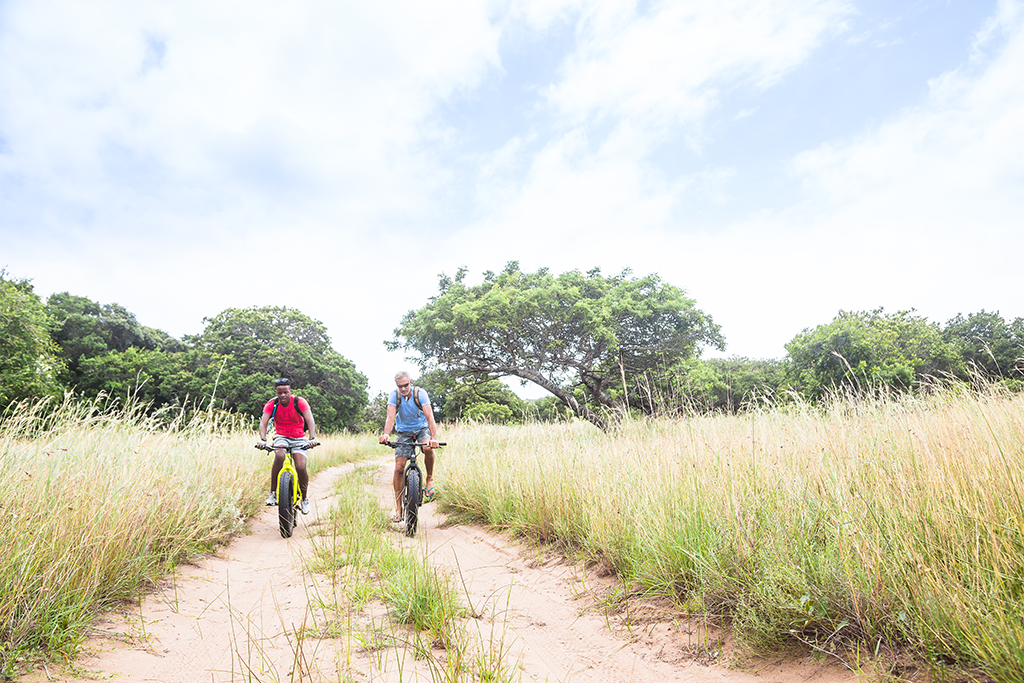
Cycling alongside Andy Coetzee, this was just after he’d offered to tow me with a bungee rope. Photo by Tyson Jopson.
8. The orange stuff keeps you going
I was refilling my hydration pack when one of the organisers, Adele Burger suggested I add the orange powder (which at the time I didn’t know was an energy sachet) to my water. I’d always naively thought it was to make the water tastier until she added – “it keeps you going”. My eyes gleamed like I’d just discovered gold as I glanced on the pack and saw “energy powder”.
9. The understated resilience of the bum
Having spent three days on a saddle without any padded pants, my bum moved from sore, to very sore, to resilient – all in three days. I’m not advanced enough to pedal while standing up, so I was on the saddle the entire time.
10. Cycling is really addictive
When you get into cycling, you almost never want to get off the bike. At the end of each day of the tour, I wanted to move even further and if it was practical enough, I’d spend all my days cycling. Since the cycling bug has hit me, I am sympathetic towards those biking squads in my township who always gave their mothers headaches about coming home late, even though it seemed to me at the time that they had nowhere significant to go that required such a serious dedication to pedalling. Now, I understand wholeheartedly their dedication.
11. Cyclevangelism is real
Cyclists I met on this trip were passionate about cycling and all things bicycles. Not only did they not mind my initial inability to move the bike on the undulating track, they were all determined to convert me into a bonafide cyclist with all sorts of tips and encouragement. It felt a bit like the first time you go to church and everyone is suddenly determined to ensure that you are successfully converted. To this day, 67-year-old cyclist, Alisson Gans (who arrived on the first day in a pink t-shirt written ‘I love bicycles’), checks up on me to find out how the training for the Cape Epic is coming along. Cyclists don’t just love cycling like Christians don’t just love Jesus – they want everyone they come across to share their unrelenting dedication to the bike.
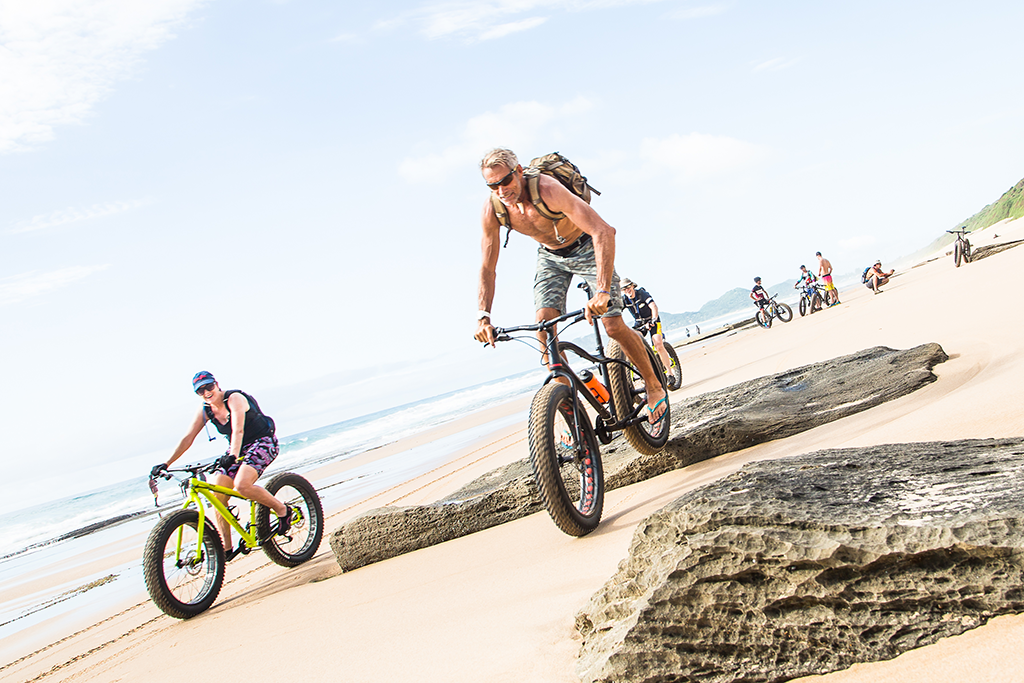
Alisson Gans and Andy Coetzee. Alisson later shared that they had attended the same primary school.
Read the story in the August 2017 issue of Getaway magazine.
Get this issue →
Our August issue features 14 Northern Cape treasures, a trip along Mozambique’s pristine beaches on a fat-bike, holidays to take if you want to learn a new skill and so much more.
You may also like
Related Posts
Whether you're heading to Durban, Gauteng and Cape Town or the Garden Route, there's lots...
read more
In the midst of one of Australia's most drastic heatwaves yet, both locals and animals...
read more
In January, four South Africans set out from Cairo on their heavily-laden bikes to get...
read more